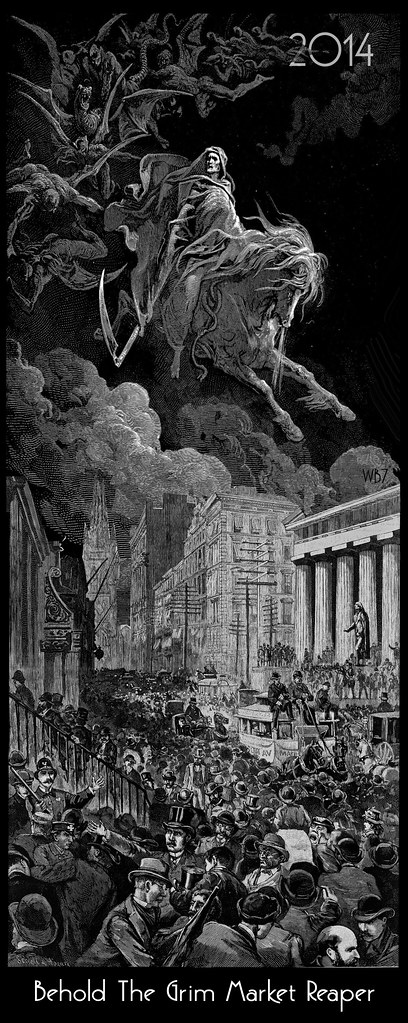Submitted by James H. Kunstler of Kunstler.com,
If being wealthy was the same as pretending to be wealthy then people who care about reality would have a little less to complain about. But pretending is a poor way for a society to negotiate its way through history. It makes for accumulating distortions which eventually undermine the society’s ability to function, especially when the pretending is about money, which is society’s operating system.
The distortion that even simple people care about is that the gap between the rich and the poor is as plain, vast, and grotesque as at any time in our history — except perhaps during slavery times in Dixieland, when many of the poor did not even own their existence. We’ve had plenty of reminders of that in pop culture the last couple of years, including Quentin Tarantino’s fiercely stupid movie Django Unchained and the more recent melodrama 12 Years a Slave. But you have to wonder what young adults weighed down by unpayable college debt think when they go to see them, because without a rebellion that millennial generation will not own their own lives either. They must know it, but they must not know what to do about it.
The pretense and distortions start at the top of American life with a President who broadcasts the message that some kind of “recovery” has occurred in the economic affairs of the country. Either he just wants the public feel better, or he is misled by the people and agencies in his own government, or perhaps he just lies to keep the lid on. To truly recover from the dislocations of 2008, we would have to make a consensual decision to start behaving differently in the process of adapting to the new circumstances that the arc of history is presenting to us. We’d have to decide to leave behind the economy of financialization, suburban sprawl, car dependency, Wal-Mart consumerism, and prepare for a different way of inhabiting North America.
The dislocations of 2008 when the banking system nearly imploded were Nature’s way of telling us that dishonesty has consequences. The immediate dishonesty of that day was the racket in securitizing worthless mortgages — promises to pay large sums of money over long periods of time. The promises were false and the collateral was janky. It got so bad and ran so far and deep that it essentially destroyed the mechanism of credit creation as it had been known until then, and it has not been repaired.
Since then, we have pretended to repair the operations of credit by falsely substituting bank bailouts and Federal Reserve “quantitative easing” (QE) or digital money-printing for plain dealing in borrowed money between honest brokers at the local level. The unfortunate consequence is that in the process we have distorted — and possibly destroyed — the value of our money and the various things denominated in it, especially securities, bonds, stocks and other money-like paper.
The crash of the mortgage racket occurred not just because of swindling and fraud among bankers; in fact, that was only a nasty symptom of something larger: peak oil. I know that many people have come to disbelieve in the idea of peak oil, but that is only another mode of playing pretend. Peak oil, which essentially arrived in 2006, undermined the basic conditions of credit creation in an advanced techno-industrial society dependent on increasing supplies of fossil fuels. Most people, including practically all credentialed economists, fail to understand this. There is a fundamental relationship between ever-increasing energy supplies > economic growth > and credit-based money (or “money,” if you will). When the energy inputs flatten out or decrease, growth stops, wealth is no longer generated, old loans can’t be repaid, and new loans can’t be generated honestly, i.e. with the expectation of repayment. That has been our predicament since 2008 and nothing has changed. We are pretending to compensate by issuing new unpayable debt to pay the interest on our old accumulated debt. This pretense can only go on so long before our economic relations reflect the basic dishonesty of it. Reality is a harsh mistress.
In the meantime, we amuse ourselves with fairy tales about “the shale oil revolution” and “the manufacturing renaissance.” 2014 could be the year that the forces of Nature compel our attention and give us a reason to stop all this pretending.
![]()
via Zero Hedge http://feedproxy.google.com/~r/zerohedge/feed/~3/BB4QIf0fKYI/story01.htm Tyler Durden







 Rather than seeing libertarians in opposition to
Rather than seeing libertarians in opposition to A federal judge has issued a declarative
A federal judge has issued a declarative The ruling came in response to a
The ruling came in response to a Posts like this tend to set off
Posts like this tend to set off


 Ronald Bailey reviews
Ronald Bailey reviews
